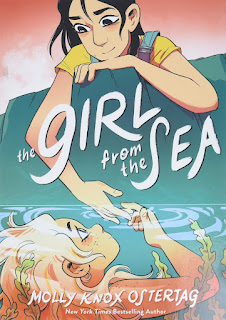Narrator: everything will not be fine
Morgan is at the center of Molly Knox Ostertag's mid-grade graphic novel The Girl from the Sea, and I think every reader - even those on the young and thoughtless end of that age-band - will sense that Morgan protests too much, that she can't keep all of the boxes separate. Her parents have already separated when the story starts, so that's one box broken up...and that, of course, is the point: she's trying to control the things she thinks she can control, because something so central to her life was just totally uncontrolled.
In the opening pages of Girl from the Sea, Morgan slips on some rocks and nearly drowns. She's saved by what she thinks is a cute girl, Keltie. And, if we readers are paying attention, we notice one very big box that she's trying to keep separate and closed: that she likes girls. She thinks that's got to stay hidden until she gets away, that it can only be a piece of her eventual adult life.
But Keltie is not just a cute girl: she's something more special, and already loves Morgan. She's loud and pushy and wants things and can show Morgan different ways of viewing and living her life.
Some of that is a metaphor for coming out. But a lot of it is literal: Keltie is a selkie, transformed from seal to girl, and with a lot of the traditional folkloric issues. (Ostertag plays a bit with reader expectations for some of these, I think, especially Keltie's skin, but she's not retelling any specific story or doing the usual folkloric stuff here.)
So: this is a story about whether Morgan will let herself unbend, if she will let herself break through her own boxes and be the person she actually is right now. And what will happen along the way: do her friends and family react the way she fears they will?
Oh, and Keltie has something pretty important she needs to do, too - she's not in human form for nothing. Oh, sure, she's crazy about Morgan, too - that definitely is part of it - but she has a mission for her people as well, and that's not optional.
I liked Girl from the Sea better than Ostertag's Witch Boy books - those were fine, but had a slight whiff of formula about them, a sense that they were Teaching Lessons and Being Good Models and all that. Girl from the Sea feels more personal and specific, tied to a specific place Ostertag knows well and centered in a deep but new relationship. I also like the way it implies conflicts that never happen - there are things that are huge in Morgan's head but don't really exist in the real world. It's still very much a book for younger readers, so people even more cynical and world-weary than me might find it too too, but it's the kind of book I love to see for young readers, the kind that tells them they can be exactly the people they really are and that they have good, loving places in the world that they just need to find or make.
That may not always be true, in the actual real world. But it's an important story, and it needs to be said as often as possible.

No comments:
Post a Comment